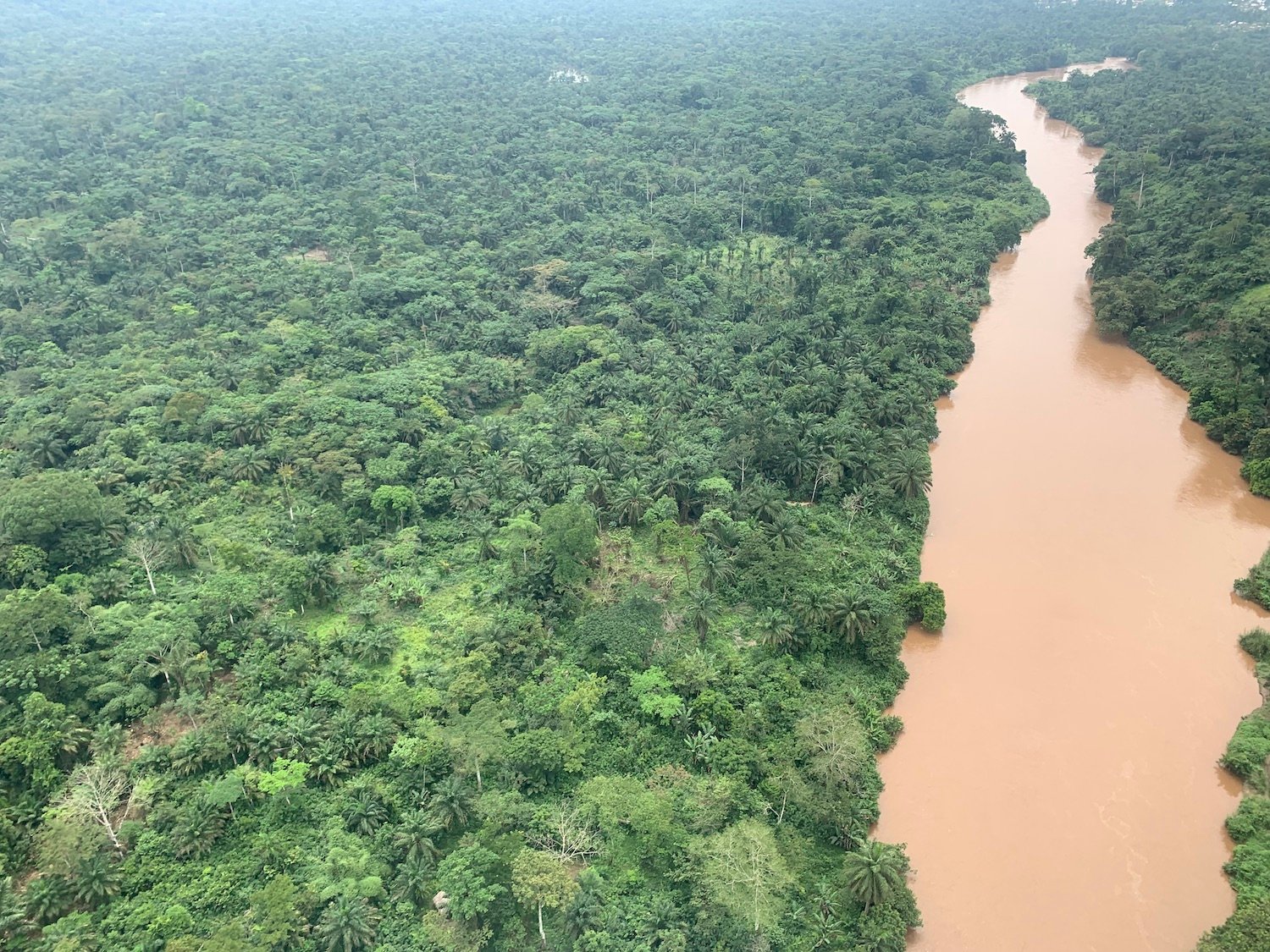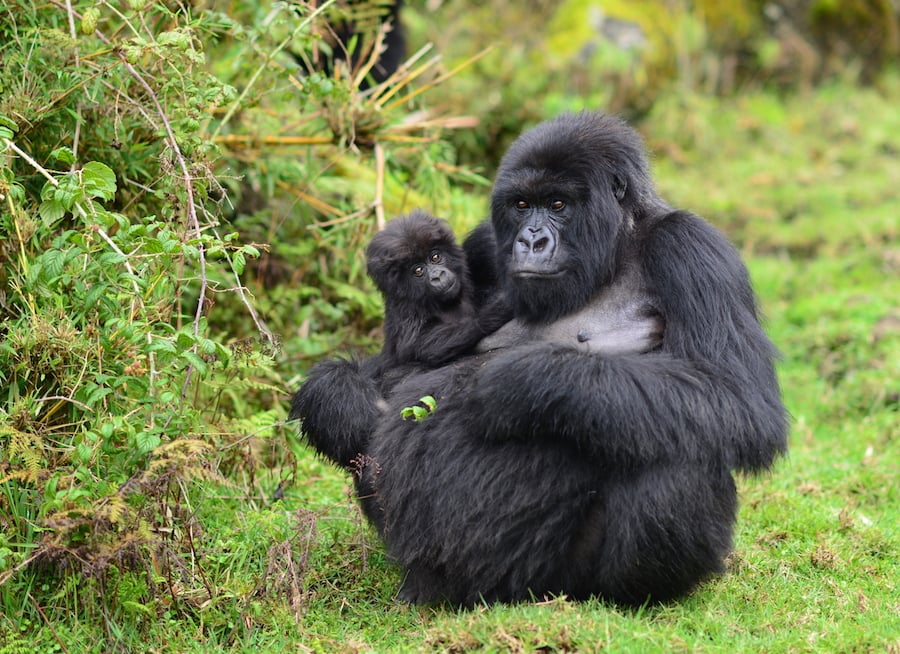Sept. 24, 2012
Two More Infant Gorillas Confiscated from Poachers, in Our Care in Congo
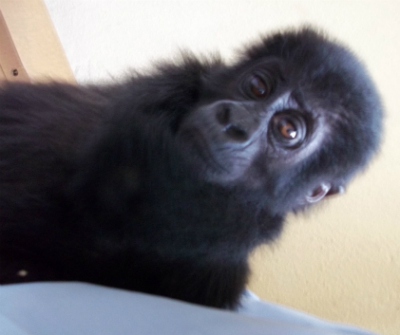 Two infant gorillas, presumed to be Grauer’s gorillas, have been confiscated recently in the Democratic Republic of Congo (DRC). The first was recovered on Sept. 12 by a Dian Fossey Gorilla Fund partner organization, Jeunesse pour la Protection de l’Environnement and Congolese law enforcement, and the second was recovered on Sept. 20 by Virunga National Park law enforcement. The law enforcement agencies and the Congolese parks authority, ICCN, have since placed both gorillas in the Fossey Fund’s care at the ICCN’s Senkwekwe Sanctuary for mountain gorillas in Rumungabo.
Two infant gorillas, presumed to be Grauer’s gorillas, have been confiscated recently in the Democratic Republic of Congo (DRC). The first was recovered on Sept. 12 by a Dian Fossey Gorilla Fund partner organization, Jeunesse pour la Protection de l’Environnement and Congolese law enforcement, and the second was recovered on Sept. 20 by Virunga National Park law enforcement. The law enforcement agencies and the Congolese parks authority, ICCN, have since placed both gorillas in the Fossey Fund’s care at the ICCN’s Senkwekwe Sanctuary for mountain gorillas in Rumungabo.
The first infant confiscated was assessed by Mountain Gorilla Veterinary Project veterinarians and ICCN staff and found to be in fairly good condition, despite signs of fatigue and dehydration. The new infant, a female, is younger than the first; veterinarians estimate her to be less than 6 months old — an incredibly delicate age for a gorilla to be without her mother.
The tiny gorilla was being held in Goma by a man who was trying to sell her. After she was confiscated, Fossey Fund Grauer’s Gorilla Conservation and Research Program Manager Urbain Ngobobo-as-Ibungu, along with others involved in the confiscation, went to the courthouse to make an official statement regarding the confiscation and obtain documents placing the infant in the Fossey Fund’s care for the time being. We are honored to be charged with these gorillas' care, and will do everything we can to help them adjust to their new life.
At the Senkwekwe Sanctuary, the infants’ caregivers, food, and supplies are provided with support from the Fossey Fund. The MGVP provides medical care. Eventually, following some weeks in quarantine, the infants will be transferred to the Gorilla Rehabilitation and Conservation Education (GRACE) center, where they will be able to join other Grauer’s gorilla orphans in a more natural setting.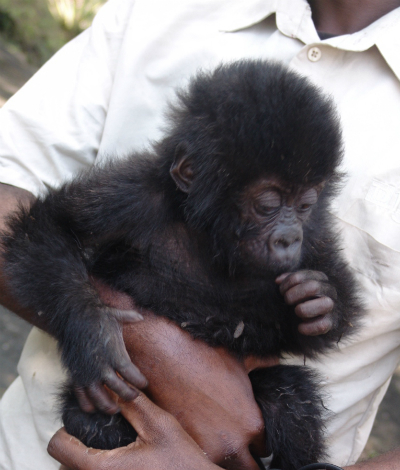 Fossey Fund staff are dismayed by the confiscation of these two infants last week. Although they are receiving proper care now, we can only imagine the trauma they have experienced and the damage poachers inflicted on their groups in order to obtain them. Almost certainly, adult gorillas died trying to protect them. Any information we are able to put together regarding their origins is important to help prevent further Grauer’s infants from being poached.
Fossey Fund staff are dismayed by the confiscation of these two infants last week. Although they are receiving proper care now, we can only imagine the trauma they have experienced and the damage poachers inflicted on their groups in order to obtain them. Almost certainly, adult gorillas died trying to protect them. Any information we are able to put together regarding their origins is important to help prevent further Grauer’s infants from being poached.
According to reports, both infants originate from Walikale, in the North Kivu Province of DRC. The Fossey Fund has been focusing our Grauer’s gorilla program efforts on this area, as it appears to be home to a large population of this subspecies. There are two protected national parks in the region, Kahuzi Biega National Park and Maiko National Park, but Walikale, which is situated between the two parks, is not under ICCN management, which makes its forests particularly vulnerable to poaching. The current political unrest in DRC may also be playing a role in gorilla trafficking, as some of the rebel groups active in this region appear to be participating in the trafficking.
According to Ngobobo, the Walikale forests are an important ecological corridor between the two parks. “Walikale is really a remote area,” says Ngobobo. “It is a forest full of Grauer’s gorillas in the non-protected area. And this is really an issue for us, because it looks like the epicenter of gorilla traffic.”
For the Fossey Fund’s Grauer’s Gorilla Conservation and Research Program, one of the most important objectives right now is to support community-based conservation, surveillance and monitoring initiatives in this area, so that community members and local organizations can actively protect their forests from illegal activities. Although it is a challenging region to work in, incidents like the confiscations this week are a sure sign of how essential conservation efforts are in protecting Grauer’s gorillas in Walikale.
Ngobobo says, “We need a holistic strategy, including an effort to support community-based conservation…. In the bush, in Walikale, we are supporting the community-based reserves in monitoring, socio-economic activities, and sensitization, and local associations like JPE help a lot.”
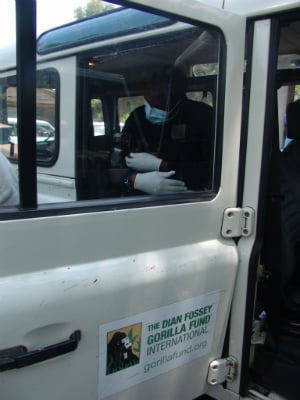 The Fossey Fund believes that this collaborative approach to Grauer’s gorilla conservation is the best strategy for combatting poaching, especially given the current crisis in Congo. Not only are these local networks the best way to obtain information about security and illegal activities on the ground, but involving local people in direct conservation, surveillance, and monitoring activities also allows them to make a living protecting the forests.
The Fossey Fund believes that this collaborative approach to Grauer’s gorilla conservation is the best strategy for combatting poaching, especially given the current crisis in Congo. Not only are these local networks the best way to obtain information about security and illegal activities on the ground, but involving local people in direct conservation, surveillance, and monitoring activities also allows them to make a living protecting the forests.
We sincerely hope that these two confiscations last week will turn out to be unfortunate, but isolated, incidents. However, given the current security issues in DRC, the Dian Fossey Gorilla Fund and its partner organizations will need to remain on high alert for information about other orphaned gorillas in order to intervene quickly. In the meantime, we will focus our efforts on providing the best possible care to rehabilitate these two young Grauer’s gorillas and to provide some semblance of the environment they might have enjoyed had they not been stolen from the wild.

